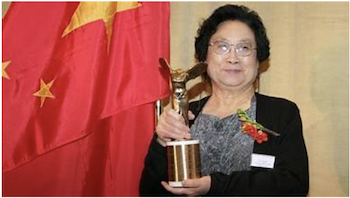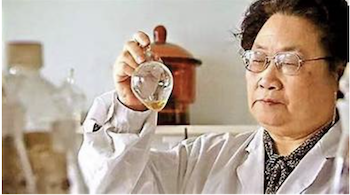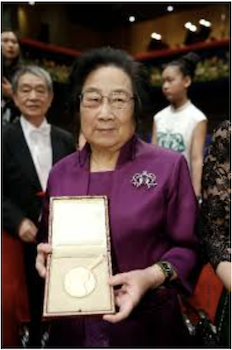
Tu Youyou was born on December 30, 1930, in Ningbo, Zhejiang Province, China. She was her family’s only daughter and had four brothers. Her father, Tu Liangui, was a banker, and her mother, Yao Zhongqian, was a housewife. Throughout her childhood, her family stressed the importance of education, despite her being a girl growing up in a time when it was uncommon for women to receive schooling, much less upper-level education. That way, Youyou’s parents ensured that she received a good education from primary school to university, defying the odds of girls not getting an education in this period.
Throughout her schooling, she attended the most prestigious institutions in the region, such as the private Ningbo Chongde Primary School, Ningbo Maoxi Primary School, Ningbo Qizheng Middle School, and Ningbo Yongjiang Girls’ School. Sadly, at the age of 16, Youyou contracted tuberculosis, inhibiting her from attending school for two years. Nonetheless, she maintained and excelled in her education, attending the private Ningbo Xiaoshi High School and Ningbo High School.

After her secondary schooling, due to her excellent grades and interest in tuberculosis, she continued her education in medical research. From 1951 to 1955, Youyou attended the world-renowned Department of Pharmacy of the Medical School of Peking University for the pharmacy major, known today as the independent Beijing Medical College. However, despite being well-educated and attending a respected university, Youyou was looked down upon for pursuing the field of chemistry and pharmaceuticals because of her gender. Still, she continued her passion and career in the field.
In 1965, she was the Chief Scientist at the Institute of Chinese Materia Medica under the China Academy of Traditional Chinese Medicine. This job was her first and only, as she continues working there nowadays. Through this job, she procured countless chemistry research, enough so that the Chinese government tasked her with finding a malaria cure. Thus, in 1969, she led a team of chemistry and pharmaceutical researchers in a project known as Project 523 to successfully produce a cure for malaria. She and her team battled the stigma of using traditional Chinese techniques to create a cure, with the belief that modern medicine was the future. Although most of her life was dedicated to research, Youyou married Li Tingzhao, a former classmate and factory worker, in 1963 and had two daughters.

Youyou studied ancient Chinese dynasty medical tests to find a traditional cure for malaria until 1971. Then, after years of tests, research, and more than 190 failed attempts, Youyou and her team successfully extracted and isolated the antimalarial substance of qinghaosu, also known as artemisinin, from the plant Artemisia or Sweet Wormwood as a cure for malaria. As a result, Youyou discovered that this natural drug inhibits the malaria parasite, making it a traditional solution to malaria.To test her hypothesis, Youyou bravely volunteered to be the first human test subject for the drug. This testing proved her hypothesis correct, and she was able to save millions of lives from malaria.
Due to her successful findings, Youyou was awarded the 2015 Nobel Prize for Physiology or Medicine. She became the first mainland Chinese scientist to receive a Nobel Prize without foreign training, education, or medical degrees. Hence, Youyou is continuing her legacy as the Chief Scientist at the China Academy of Traditional Chinese Medicine. Currently, Youyou, at the age of 93, has settled in Beijing with her two daughters and husband, and is a representative of the first generation of Chinese medical workers after the formation of the People’s Republic of China (est. 1949).
Tu Youyou has paved the way for both Asians, specifically Asian women, in modern medicine. Her discovery of a traditional cure for malaria led her to become the first Chinese woman to win a Nobel Prize, creating a path for women of color to be recognized for their contributions to science and medicine. She became a symbol of success and determination for women in a male-dominated field, encouraging more women to pursue careers in STEM. In addition, despite growing up in an era where women had limited educational opportunities, she overcame institutional barriers and excelled in her studies and her work, proving that women deserve to have equitable educations to help them thrive. Overall, Youyou has been a role model for female scientists globally.
Why Did I Choose to Research Tu Youyou?
I chose to research Tu Youyou because I was inspired by her determination and tenacity in her work, despite facing numerous systemic challenges. Although prior to researching her, I maintained my goal of becoming a doctor, gaining knowledge on Youyou has made me stronger and more resilient in my work and in pursuing opportunities. When I stumbled upon an article about forgotten women in science, I revered her and her discoveries and contributions to her culture and background, I was intrigued by the woman who defied stigma and proved that Chinese and traditional medicines are still helpful today. Thus, when I learned about Tu Youyou, she amazed me because of how incredibly life-changing and humble she was from being the first human subject of her new vaccine to paving a path for Asian women in science, showing that she is a true hero. The work of Youyou and her accomplishments continue to inspire me to help everyone I can and remember that I can change the world if I put my mind to it.
Works Cited
Liu, W., & Liu, Y. (2016). Youyou Tu: significance of winning the 2015 Nobel Prize in Physiology or Medicine. Cardiovascular Diagnosis and Therapy, 6(1), 1–2.https://doi.org/10.3978/j.issn.2223-3652.2015.12.11
Rogers, K. (2015, October 7). Tu Youyou | Chinese scientist and phytochemist. Encyclopedia Britannica.https://www.britannica.com/biography/Tu-Youyou
The Nobel Prize | Women who changed science | Tu Youyou.(n.d.). www.nobelprize.org.https://www.nobelprize.org/womenwhochangedscience/stories/tu-youyou#:~:text=Tu%20Youyou%20turned%20to%20Chinese
Tu Youyou: An Outlier of China’s Scientific and Technological System. (n.d.). Council on Foreign Relations.https://www.cfr.org/blog/tu-youyou-outlier-chinas-scientific-and-technological-system
This article was published on 11/6/2024